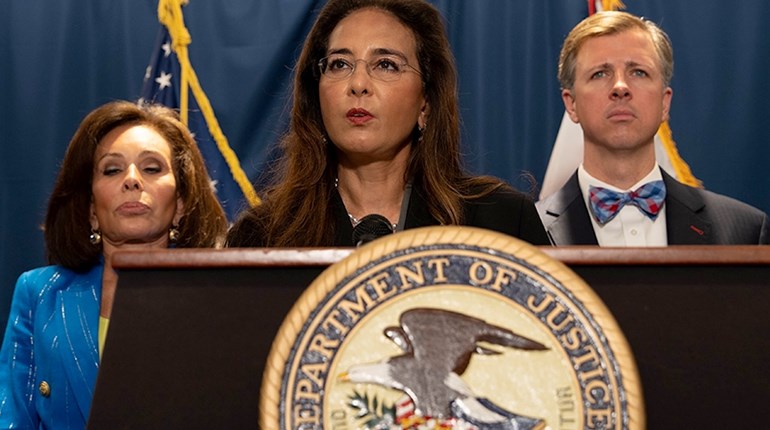
Many anti-gun politicians share the same goals—including the elimination of the Second Amendment right to keep and bear arms and civilian disarmament. However, the means they use to pursue these ends may vary and are dictated by the political and legal framework of the moment.
Case in point is consecutive anti-gun presidential administrations’ approach to Federal Firearms Licensees (FFLs or gun dealers). Some anti-gun presidents have attempted to crack down on private firearms transactions by demanding a wider swathe of gun owners obtain an FFL. Other presidents have done the exact opposite, trying to eliminate FFLs, which are often small businesses.
Those were simpler times, when even anti-gun politicians may have felt the need to feign some measure of fidelity to the U.S. Constitution or federal statute to mask their prohibitionist aims. President Joe Biden and Attorney General Merrick Garland observe no such obligation.
Biden’s ATF is conducting a war on FFLs, shutting down well-meaning gun dealers for minor paperwork violations. At the same time, Biden’s Department of Justice is seeking to curtail lawful private firearm transfers by misinterpreting federal law concerning when a private firearm seller must obtain an FFL.
The Gun Control Act of 1968 (GCA) created the modern legal framework around selling firearms in the U.S. Under the law, those “engaged in the business” of selling firearms must obtain an FFL and keep records of the firearms they transfer. Later, the 1993 Brady Bill would require FFLs to conduct a background check using the FBI’s National Instant Criminal Background Check System (NICS) on prospective gun buyers. Private individuals who do not sell firearms as a business, such as ordinary gun owners or collectors, are not required to obtain an FFL and may sell firearms to other private individuals without federal government interference.
In the early years following the GCA’s enactment, ATF set about harassing private individuals whom the agency contended were dealing firearms without a license. Describing ATF’s tactics, an April 1980 Reason magazine article explained, “One or two agents approach a collector at a gun show and make a purchase. The same happens at the next gun show, and so on, until the ‘implied dealer’ has made four to six sales. At this point, the collector is booked on felony charges of dealing without a license.”
The problem proved so acute that Congress addressed the matter in the Firearms Owners’ Protection Act of 1986 (FOPA). That legislation further defined “engaged in the business” to provide gun owners with a clearer understanding of conduct that is permissible without an FFL. As attorney and Second Amendment scholar David T. Hardy explained in a history of FOPA for the Cumberland Law Review, “The central thrust of the FOPA definition is toward limiting the term ‘engaged in the business’ to those who treat firearm sales as a business, either of the ‘storefront’ or the ‘itinerant peddler’ variety.”
In the 1990s, President Bill Clinton and his anti-gun allies took exception to the number of FFLs helping Americans exercise their Second Amendment rights. So, on Aug. 11, 1993, Clinton directed the Secretary of the Treasury (at the time, ATF was under the Department of the Treasury) to take “whatever steps are necessary” to decrease the number of FFLs. ATF complied, issuing regulations that would put many small gun dealers out of business. From 1994 to 2007, the number of gun dealers fell 80%.
President Barack Obama took the opposite tack. During his time in the White House, gun-controllers were clamoring to criminalize private firearm transfers. So, in 2016, the Obama ATF issued a document titled, “Do I need a license to buy and sell firearms?” The document summarized the Obama administration’s take on the relevant federal law and encouraged those who met their interpretation of “engaged in the business” to obtain an FFL.
The Biden approach is an attempt to impede access to firearms altogether.
The president first targeted FFLs. On June 23, 2021, the Biden-Harris administration announced a “zero- tolerance” policy for what it termed “rogue gun dealers.” The announcement made clear that “[a]bsent extraordinary circumstances that would need to be justified to the Director, ATF will seek to revoke the licenses of dealers the first time that they violate federal law,” even in a handful of trivial instances. In December 2021, ATF updated its “Federal Firearms Licensee Quick Reference and Best Practices Guide” to reiterate the oppressive new regime.
For instance, revokable offenses include “falsifying records, such as a firearms transaction form.” This could cover small and inconsequential clerical errors on a Form 4473 (firearm transaction record). Any small-business owner should be sympathetic to the notion that, over the course of many years and thousands of transactions, they—or an employee—might be capable of an innocent paperwork mistake.
Another zero-tolerance offense is “failing to run a required background check.” It would be one thing if this was used to revoke the license of a dealer flouting federal law by refusing to run NICS checks. In reality, the new standard has been used to target well-meaning FFLs who mistakenly accept what they believe are NICS-exempt right-to-carry permits or conduct a NICS check using forms of identification that are invalid or may have expired.
From the position of a gun banner like Biden, the war on FFLs is working. On Aug. 18, The Wall Street Journal published an article titled, “Hundreds of Gun Dealers Lose Licenses Under Biden Administration Crackdown.” The paper explained that the ATF has “revoked the licenses of 122 gun dealers in the fiscal year that began in October, up from 90 for all last fiscal year and 27 in 2021.” A July 6 item from the National Shooting Sports Foundation, the trade association for the firearm industry, pointed out that in fiscal year 2020 “there were just 40 license revocations.” ATF inspection data shows that there were 36 in just June and July of this year.
Despite the stark increase in revocations, these numbers understate the problem. ATF bullies many FFLs into surrendering their licenses without going through the formal revocation procedure. Moreover, there’s no telling how many good people the Biden administration’s intimidation tactics have prevented from entering the industry.
The 2022 federal gun-control omnibus bill, the Bipartisan Safer Communities Act (BSCA), provided the Biden administration with a new opening to distort the law to attack gun owners.
Recall, private individuals are allowed to sell guns out of their own collections, if they are not “engaged in the business” of selling firearms. The unwise 2022 legislation slightly altered the statutory definition of “engaged in the business.” The bill did so by removing language requiring a person’s behavior be “with the principal objective of livelihood and profit,” changing it to require the conduct be “to predominantly earn a profit.”
The altered “engaged in the business” definition maintains language making clear that a “course” of “repetitive” buying and reselling of firearms is required to meet the definition of “engaged in the business.” Moreover, the definition still makes clear that the “term shall not include a person who makes occasional sales, exchanges, or purchases of firearms for the enhancement of a personal collection or for a hobby, or who sells all or part of his personal collection of firearms.”
At the time, some involved in concocting the BSCA assured NRA-ILA that these minor textual changes would not impede law-abiding gun owners’ right to transfer firearms without government interference. Knowing better, NRA-ILA warned these policymakers that altering the settled “engaged in the business” language would provide the Biden administration with the opportunity to put forward new bad-faith interpretations of the law.
Sadly, time has proven NRA-ILA correct.
On March 14, the White House announced “an Executive Order with the goal of increasing the number of background checks conducted before firearm sales.” The document noted that Biden had directed Attorney General Garland to “move the U.S. as close to universal background checks as possible without additional legislation by clarifying, as appropriate, the statutory definition of who is ‘engaged in the business’ of dealing in firearms, as updated by the Bipartisan Safer Communities Act.”
Never mind that the U.S. Congress has refused to criminalize private firearm transfers, by expressly rejecting so-called “universal” background-check legislation on numerous occasions. Biden couldn’t resist an occasion to pervert federal law. A Politico headline summed up Biden’s scheme, stating in part, “Biden bypasses Congress.”
According to an Aug. 1 article in The New York Times, the new regulation would “set a threshold number of transactions that would define a dealer.” The article added, “gun-control groups hope to see it at five sales a year or lower.”
Nothing in the new definition of “engaged in the business” contemplates a threshold number of firearm transactions. Rather, the relevant requirement is for “repetitive purchase and resale of firearms” with a profit-seeking motive. Absent this motive, any number of transactions should be permissible. Under any reasonable reading, those selling all or part of a personal collection are exempt from the definition regardless of any profit they derive.
On Aug. 31, ATF issued a notice of proposed rulemaking concerning the “engaged in the business” definition. Noticeably absent was a threshold number of transactions that would trigger the dealer-licensing requirement. In fact, DOJ acknowledged there is no justification for such a number, stating, “the Department does not believe there is a sufficient evidentiary basis, without consideration of additional factors, to support a specific minimum number of firearms bought or sold for a person to be considered ‘engaged in the business.’”
However, that’s where the sanity ends. Much of the rest of the proposed rule aims to intimidate gun owners into forgoing lawful private firearm transactions.
The proposal lists what DOJ will consider indicia of having “the intent to predominantly earn a profit” when selling firearms, which the department contends will create a rebuttable presumption against gun owners in civil and administrative proceedings. These include things that gun owners and collectors have long enjoyed that bear little relation to whether they are “engaged in the business” of selling firearms— such as taking out an ad in a gun-club newsletter, posting a gun for sale in an online forum, or renting table space at a gun show. Perhaps understanding the flimsy nature of this type of legislating by executive fiat, DOJ acknowledged that these dubious presumptions “shall not apply to criminal cases.”
Aside from the U.S. Congress explicitly rejecting so-called “universal” background-check legislation, the people’s elected representatives have also refused numerous bills contemplating a narrower set of restrictions on the private sale of firearms pursuant to classified ads and gun shows, with the most notable iteration being the 2013 Manchin-Toomey-Schumer proposal.
In the coming months, NRA-ILA will submit official comments on Biden’s proposed rulemaking. Further, NRA-ILA is already working with our allies in Congress to address this matter and stands ready to challenge this executive power grab in the courts if necessary. Gun owners should respond to Biden’s twin attacks on gun rights by informing their family, friends and neighbors of Biden’s actions and how to put an end to them on Nov. 5, 2024.


































